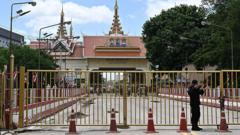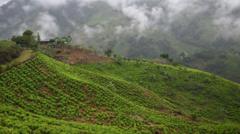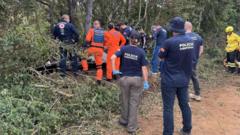The brief abduction of actor Wang Xing raises alarm among Chinese tourists, leading to canceled trips and events in Thailand.
**Chinese Travelers Reevaluate Thailand Amid Abduction Scandal**

**Chinese Travelers Reevaluate Thailand Amid Abduction Scandal**
Concerns rise after a Chinese actor's abduction highlights safety issues, impacting tourism.
In the aftermath of a deeply unsettling incident involving the abduction of Chinese actor Wang Xing, a chilling sense of insecurity has swept through the Chinese community planning travels to Thailand. The actor was reportedly taken from the Thai border city of Mae Sot and forced into labor within a scam camp in Myanmar. His rescue has revealed troubling safety concerns that are now influencing travel decisions among Chinese nationals.
In light of the kidnapping, there has been a marked decline in intended visits to Thailand, crucial for tourism, especially with the Lunar New Year holiday approaching. Many eager travelers are now opting to avoid Thailand altogether, prompting a series of cancellations in both flights and planned events tied to the holiday festivities. High-profile figures from the entertainment industry, like Hong Kong pop sensation Eason Chan, have canceled much-anticipated performances—citing safety apprehensions for visitors from China. Similarly, renowned comedian Zhao Benshan has postponed an appearance in Bangkok which had garnered significant interest.
Thai Lion Air has recorded an uptick in canceled charter flights, with approximately 20% being axed in the wake of these safety fears. Social media platforms, particularly Weibo, have seen discussions trending on travel refunds, safety evaluations, and alternative destination preferences amid the growing concerns. Travel agents across China have reported an influx of inquiries requesting changes in travel plans, indicating a significant shift in consumer sentiment regarding travel to Thailand.
Tourism officials in Thailand face a pressing challenge of restoring confidence among potential Chinese travelers. With the Lunar New Year typically marking one of the peak periods for tourism from China, the ramifications of this incident could pose a long-lasting impact on Thailand's tourism sector if safety issues are not adequately addressed. The situation highlights the intertwined nature of safety perceptions and economic stability in the tourism industry, underscoring the necessity for both nations to work towards strengthening security measures and ensuring traveler assurances.
In light of the kidnapping, there has been a marked decline in intended visits to Thailand, crucial for tourism, especially with the Lunar New Year holiday approaching. Many eager travelers are now opting to avoid Thailand altogether, prompting a series of cancellations in both flights and planned events tied to the holiday festivities. High-profile figures from the entertainment industry, like Hong Kong pop sensation Eason Chan, have canceled much-anticipated performances—citing safety apprehensions for visitors from China. Similarly, renowned comedian Zhao Benshan has postponed an appearance in Bangkok which had garnered significant interest.
Thai Lion Air has recorded an uptick in canceled charter flights, with approximately 20% being axed in the wake of these safety fears. Social media platforms, particularly Weibo, have seen discussions trending on travel refunds, safety evaluations, and alternative destination preferences amid the growing concerns. Travel agents across China have reported an influx of inquiries requesting changes in travel plans, indicating a significant shift in consumer sentiment regarding travel to Thailand.
Tourism officials in Thailand face a pressing challenge of restoring confidence among potential Chinese travelers. With the Lunar New Year typically marking one of the peak periods for tourism from China, the ramifications of this incident could pose a long-lasting impact on Thailand's tourism sector if safety issues are not adequately addressed. The situation highlights the intertwined nature of safety perceptions and economic stability in the tourism industry, underscoring the necessity for both nations to work towards strengthening security measures and ensuring traveler assurances.




















